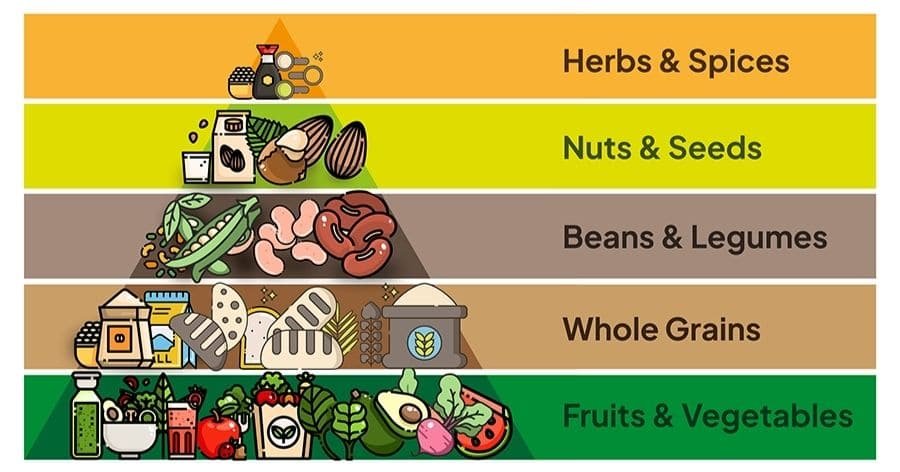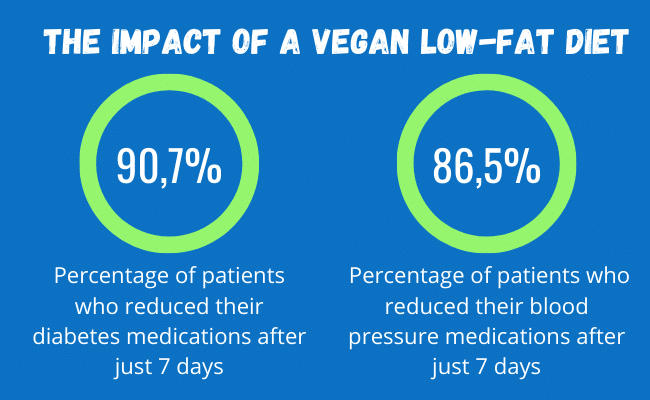McDougall Program: The Effect Of A Vegan Low-Fat Diet After 7 Days

What are the effects of a vegan low-fat diet on 1615 people? Remarkable, to say the least. Weight loss, lower cholesterol, and lower blood pressure are just some of the benefits.
The McDougall Program
The McDougall Program is a 10-day live-in program in the USA. Dr McDougall is the architect of the program, which has been running since 2002.
From the beginning, the results of the program were remarkable. In 2014 the results of 1615 participants who had been part of the vegan low-fat diet program between 2002-2011 were gathered and published in the Nutrition Journal.
Before going deeper into the effects, let’s take a brief look at what the vegan low-fat diet entails.

What is the Vegan Low-Fat Diet?
The vegan low-fat diet is not the most accurate term to describe the program’s diet. Dr McDougall prefers to call it the starch-based diet. It’s a whole food plant based, oil-free way of eating with an emphasis on starchy foods like potatoes, rice, and wheat.
From the beginning, the results of the program were remarkable. In 2014 the results of 1615 participants who had been part of the vegan low-fat diet program between 2002-2011 were gathered and published in the Nutrition Journal.

Before going deeper into the effects, let’s take a brief look at what the vegan low-fat diet entails. While it is a plant-based way of eating, Dr McDougall prefers to call it a starch-based diet.

A vegan low-fat diet is also sometimes referred to as a Whole Food, Plant-Based diet. These different terms can be confusing, but we are here to clear the doubt. Just remember that they have one main thing in common: Increase the consumption of plant-based foods. This simple pyramid will give you a good idea of what direction to take.
The Starch Based diet
Starches
Grains
- Barley, brown rice, bulgur wheat, corn, farro, millet, oats, rye, spelt, triticale, and wheat berries. With these grains, you can make and the following foods: Bread, tortilla, flatbread, pasta, couscous, and whole cereal grains are examples of products made of these grains.
Legumes
- Dried beans (adzuki, cranberry, black, cannellini, fava, chickpeas, great northern, kidney, lima, mung, navy, pinto, soy, white beans)
- Peas (black-eyed peas, split peas, whole yellow peas, green peas)
- Lentils (green, red, brown)
Starch vegetables
- Potatoes, sweet potatoes, pumpkin, butternut, acorn, buttercup, Hubbard, kabocha cassava, burdock, taro, yams
Nonstarchy foods
- Green, yellow, orange and multicolored vegetables
- All fruits
Foods to avoid
- Meat (ie, beef, pork, lamb)
- Poultry (ie, chicken, turkey, duck)
- Fish and shellfish
- Dairy (milk, cheese, yogurt, sour cream)
- Eggs
- Animal fats (ie lard and butter)
- Vegetable or plant oils (including olive, corn, flaxseed, canola, and safflower)
- Processed and packaged foods, except for the ones containing only permitted ingredients
Some plant foods may slow progress for those people who want to lose weight, or for those who have a chronic disease.
Dr McDougall recommends those people to avoid these foods. Otherwise, small quantities of these foods can be added to the starch-based diet:
- Avocados
- Dried fruits
- Flours (whole grain, white, all-purpose)
- Fruit and vegetable juices
- Nuts
- Peanuts and peanut butter
- Seeds
- Simple sugars (i.e., table sugar, maple syrup, molasses, agave)
Let’s now take a closer look at the results after 7 days. Remember that most participants were accustomed to the Western diet rich in animal foods and processed foods. Switching to the low-fat vegan diet showed some remarkable results within just a few days!
Results
At the moment of entering the program:
- 84.3% of the participants reported a history of disease
- 64% reported a history of high cholesterol
- 39.6% reported a history of hypertension
- 79.5% reported using at least one medication for diabetes, hypertension, and high cholesterol
- 71.6% reported as being overweight
After 7 days, the average:
- weight loss was 3 pounds (1.4kg)
- decrease in cholesterol was 22 mg/dL
- systolic blood pressure drop was 18 mm Hg
- glucose level dropped by 3 mg/dL


Of those who were using medication at the beginning of the program:
- 90.7% of patients on diabetes medications reduced their dosage or could stop using their medication altogether
- 86.5% of patients on blood pressure medication reduced their dosage or could stop using their medication altogether
The research paper concludes that the low-fat, high-fiber, high-carbohydrate, vegan diet allowed participants to eat enough food to feel full and still lose weight! The patients who had the most overweight, the highest cholesterol, blood pressure, and blood sugar levels showed the most significant improvements. What made it even more remarkable was that most patients could reduce or even stop their medication.
The paper also notes that the results show a lot of promise and could encourage physicians to prescribe diet therapy before medication and surgery, which would also cut healthcare costs.
Learn how to live Whole Food Plant-Based
Are you ready to to make the dietary change?
10 Incredible Benefits of a Plant-Based Diet
Could we possibly be more thankful for plants? From oxygen to food - plants play an indispensable role in our survival, which we often overlook. In...
The High Carb, Low-Fat Diet Explained
The food we eat is a mix of macro- and micro-nutrients. The ideal proportion of nutrients in the diet is a matter of curiosity of health experts and...
The Okinawa Diet and the Secret Power of Sweet Potatoes for a Healthy and Long Life
Okinawa, a tiny island city of Japan, is one of the most remarkable places on earth famous for its diet and health secrets. Along with its...
What are the best low-fat vegan foods?
Fruits and vegetables are naturally vegan and low in fat, as well as beans and whole grains such as whole wheat, quinoa and oats.
What is a vegan low-fat diet?
A vegan low-fat diet is a diet that focusses on foods from plant sources instead of animal sources. In addition, high-fat products including vegetable oils, nuts and avocados are discouraged.
Are there high-protein, low-fat foods?
Beans, tofu and tempeh contain high levels of protein but low levels of fat, making them an ideal choice to include in meals for those following a low-fat vegan diet.
Is a low-fat plant-based diet good for losing weight?
Weight loss appears to be one of the most common effects of following a low-fat vegan or plant-based diet. For most people it takes just a few days to see the first results.
How do vegans get fat in their diet?
Plant-based foods including fruits and vegetables naturally contain some amount of fat. For most people, the amount of fat these foods contain is enough for daily consumption.
Is a low-fat vegan diet healthy?
Research is showing promising results for those who are curious about following a low-fat vegan diet, with Dr McDougal’s study resulting in weight loss, decreased cholesterol and blood pressure after just 7 days.



